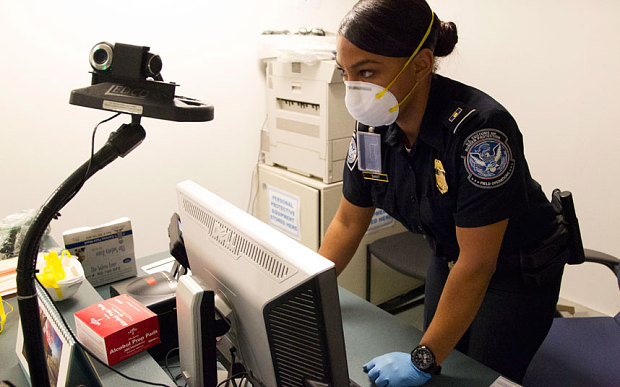U.S. Customs and Border Protection (CBP) is now taking temperatures and background information from passengers at the five airports that handle almost 95% of people traveling to the U.S. from the Ebola zone. Screening began on Saturday at JFK in New York; on Thursday it was expanded to nearby Newark Liberty, as well as Washington Dulles, Chicago O’Hare, and Hartsfield–Jackson Atlanta international airports.
The screening procedure applies to people whose journeys began in the West African countries of Liberia, Sierra Leone and Guinea, as identified through passenger manifests which CBP routinely receives. These travelers are diverted to a secondary inspection area where they are checked for fever and questioned about possible contact with Ebola victims. Those with fever above 101.5º F (38.5° C), other symptoms, or a history that raises concerns will be quarantined by the Centers for Disease Control and Prevention (CDC), although that hasn’t happened to anyone yet.

Otherwise, such passengers are sent on their way with information about Ebola symptoms and a number to call if they develop any. They’re also asked to provide a way for authorities to get in touch with them if necessary. At JKF earlier in the week, the process was taking about two hours.
Only around a tenth of a percent of international passengers come from one of the countries on the list, so the delay shouldn’t affect very many people. However, some travelers from other West African countries such as Nigeria and Ghana have also reported being questioned.
While U.S.-based screening is a new measure in the effort to contain Ebola, screening itself won’t be new to arriving passengers. For the past couple of months, people leaving the affected countries have undergone a similar screening process. It has so far failed to catch any cases of Ebola, but has resulted in a number of malaria diagnoses. Many who change planes in Europe on their way to the U.S. will have been screened there as well.
It’s not yet clear how effective the screening will be in keeping Ebola out of the U.S. The first person to die of Ebola in the country, Thomas Eric Duncan, was asymptomatic when he arrived, and thus might have been allowed to enter even if screening had been in place. Ebola’s incubation period is thought to be around 7-10 days, so someone who travels shortly after exposure is unlikely to have symptoms. If such a person isn’t aware he was exposed, doesn’t understand the questions about his recent activities, or simply lies, the CDC would have no reason to quarantine him.
On the other hand, Ebola shares symptoms with many other diseases, including malaria, tuberculosis, and even the flu. The experience with exit screening in Africa suggests that most people who are quarantined will not actually have Ebola, which could make the program less popular in the future, especially as the flu season gets underway.
For now, though, screening has the overwhelming support of the American public, with over 90% in favor of it. (Two-thirds would also support restricting travel from affected countries, which isn’t on the table at this point.) Most passengers who have undergone screening and then been interviewed by the media have also said they don’t mind the inconvenience in light of the dangers posed by the disease.

 Payment
Payment  My Account
My Account